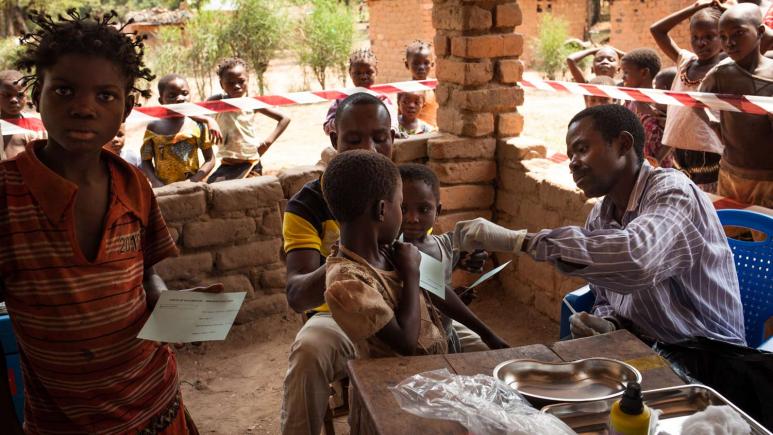MSF interventions on measles in Katanga
MSF interventions on measles in Katanga
The aim is to vaccinate children from 6 months to five years of age before or at the beginning of an epidemic, and to provide treatment for the sick. Unfortunately, no strategy has yet been developed to eliminate these recurrent epidemics due to low routine immunization coverage. It should be noted that the extent of the territory to be covered and the logistical difficulties of access to the populations are considerable. Different vaccination strategies have been deployed, often too late to prevent epidemics from spreading.
Epicentre has proposed a pilot project called "Urgepi", which consists of strengthening health surveillance, laboratory, investigation and early response to alerts. Pre-emptive vaccination began in 2018 in collaboration with the Ministry of Health. Five sentinel sites with enhanced surveillance have so far been started in 5 health zones: 4 in Upper Katanga and 1 in the Bukama health zone in Upper Lomami.
The project has responded to the various outbreaks since February 2018 but has not had the capacity to respond to other measles outbreaks occurring simultaneously in several other provinces. As the Urgepi project could not respond to the epidemic in the rest of ex-Katanga, the MSF Emergency Unit intervened in December 2018, following the alert issued by the health authorities. The aim was to support case management of measles, malaria and malnutrition cases, and to propose a vaccination response targeting children under 5 years of age, with a focus on Malemba-Nkulu (December 2018), Mukanga (January 2019) and Kitenge (January 2019) health zones.
Two retrospective mortality surveys were conducted between December 2015 and February 2016 in Malemba-Nkulu and Mukanga, following MSF interventions in these health zones during the measles epidemic in 2015 (i.e. integrated case management and reactive measles vaccination at different ages). The peak in child mortality in both areas corresponded to the peak of the measles epidemic, but also to the period of MSF intervention. More than a third of children under 10 years of age contracted measles during the year, and an estimated 10% of them perished. Most of the population, of all ages, had experienced at least one malaria episode in 2015, with an estimated 2% of them dying. Malaria mortality remained high throughout the year, especially among the youngest (the main cause of reported deaths).
MSF set out to re-document its interventions in 2018 by estimating global and specific measles and malaria mortality in children under 5 years of age during the 2018-2019 intervention periods, where the management strategy integrated measles, malaria and malnutrition management with a vaccine response (Malemba-Nkulu) and comparing it to where only measles and nutrition case management has been carried out (Mukanga).







